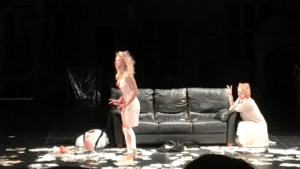Things to do
Performance review: Deliration and downpours flood the stage at Kronborg
This article is more than 9 years old.
In bad weather: tis nobler to suffer or make a quick escape off stage? The audience was divided

Ophelia was grateful for the chance to clean her bloodied hands in the rain
There was surely no place better to celebrate the 400th anniversary of Shakespeare’s death with this tribute to ‘Hamlet’, particularly given that 2016 also marks the bicentenary of the Bard’s work being performed at Kronborg Castle. And the impressive surroundings undoubtedly added a special touch to the play.
‘Hamlet: Who’s there?’ was simply executed with just six actors, who performed with the passion and lunacy that ‘Hamlet’ is all about. The actors embodied the madness and performed with a conviction that was exceptionally impressive and made everyone in the audience pay attention every step of the way.
Despite the fact the play only featured one minor character (the gravedigger) alongside the heavyweight first family roles (Hamlet, Gertrude and Claudius; and Polonius, Laertes and Ophelia), it gave life to the story and made it a more intimate experience.
It was a fresh, modern interpretation that began with the audience meeting a casually-dressed Hamlet (Mark Arends) in jeans and t-shirt while sitting on a leather sofa musing over life and his father’s death.
While the play had a modern touch, the old English language was still preserved. The contrasts complemented each other, and it was nice to see that the director (Kelly Hunter) didn’t take as many liberties with the language.
An unexpected challenge from above
The evening began with a beautiful, almost cloudless sky, and it therefore came as a surprise to both the actors and the audience when the weather viciously turned.
Laughter rippled through the audience – not for the first time during the evening – as Hamlet looked to the sky and cried that it was filled with fire, just as the rain started to pour down. But the show must go on, as the British rock band Queen once sang. At least that must be what the actors were thinking as they fought to stay in character while the rain turned worse and muffled their words.
The audience was compelled to look at the screen above the stage for the Danish surtitles (supertitles) – unfortunate for the many who weren’t Danish – when the noisy wind and rain turned the play into a pantomime.
The actors were rescued from the flood on stage when a service guard came and declared that the audience could take a short break until the rain disappeared. A few stubborn guests dressed to battle the rain with thick coats, waterproof capes, umbrellas and blankets en masse refused to move away from their seats – perhaps willing the play to go on.
With a quick smile towards the audience after the break the actors easily slipped back into their roles again and continued, as if they were never interrupted – as if it was as easy to assume a new character as it was to put on another suit of clothes.
Madness in music
A ukulele, a drum set and a choir might not be what most people associate with Shakespeare’s ‘Hamlet’, but nevertheless this was what the audience was introduced to during the play.
Maybe it was to show ‘the madness’ when Hamlet picked up the ukulele and started playing Cat Stevens’ ‘Father and Son’. Maybe it was to show his connection to the ghost of his father. Maybe it was to amuse the audience. Or maybe someone didn’t have the heart to tell the director that this was too bizarre.
This strange act wasn’t the only one. During the play Laertes sat down by the drum set – strongly encouraged by Hamlet – and began to hit the drums furiously. The drums were hit at random for quite a while. It made as much sense as the Cat Stevens act.
The choir, however, added a nice touch to the acts. A small group of people stood at the left corner at the end of the play chanting the same song and contributing to the gothic, mad feeling washing over the audience.
It was a great ending to a play that pulled the audience from their chairs at the end to deliver a standing applause.










































